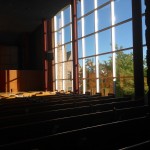Why bother joining a congregation rather than, oh, say, a bowling league?
1. To meet people.
OK, yes it’s true that you will meet new people by joining a bowling league as well, but by joining a particular sort of congregation, you will find a particular sort of people. In Unitarian Universalist congregations, and particularly in Humanist congregations, you will meet people who put integrity above comfort—because, let’s face it, belonging to a more traditional congregation is more comfortable. When someone says, “I’m a Methodist,” an entire set of beliefs and commitments can go unsaid. Methodists are an understandable brand. UUs, Humanists, agnostics, atheists . . . we get asked follow-up questions.
The people who bother to get up on a Sunday morning tend to be edgy people who want to meet other edgy people, edgy people thinking waaaaay outside the box. If we are your tribe, welcome. If we’re not . . . thanks for visiting and I hope you find what you need elsewhere.
2. To learn stuff.
We are often the object of fun for saying we want intellectual stimulation, but some of us actually do. Perhaps the laughter comes from a misunderstanding of what we mean by intellectual stimulation. We agree with activist and educator Bell Hooks who said, “To build community requires vigilant awareness of the work we must continually do to undermine all the socialization that leads us to behave in ways that perpetuate domination.”
Becoming vigilantly aware. Now that’s intellectual stimulation. We aren’t looking for intellectual answers. In fact, we’re not going to be taking anyone else’s answers anyway.
We aren’t interested in having more facts piled higher and deeper or hearing rehashes of conventional thought. We want vigilant awareness.
How often does your bowling league discuss the causes and solutions of social oppressions?
3. To share life’s milestones.
We gather in community because we are looking for a real community, a community with the goal of being as real as it gets.
In real life there is illness; suffering; disabilities; aging; oppressions of various sorts. We gather to share both the joys and the sorrows of life.
Sociologists David W. McMillan and David M. Chavis, who focused their careers on the concept of community, said,
“Sense of community is a feeling that members have of belonging, a feeling that members matter to one another and to the group, and a shared faith that members’ needs will be met through their commitment to be together.”
The trust that comes of committing to being together through life’s thicks and thins. Unitarian writer Kurt Vonnegut said, “the most daring thing is to create stable communities in which the terrible disease of loneliness can be cured.”
That is a laudable goal. Congregations achieve it.
Bowling leagues? Perhaps you’ll get a beer for your birthday.
4. To model the struggle.
We struggle with our own sense of self; we struggle with meaning and purpose; we struggle to achieve justice. In community we see others struggling, and we learn something about ourselves and our capacities.
Sociologist Emile Durkheim claimed that, “Man cannot become attached to higher aims and submit to a rule if he sees nothing above him to which he belongs. To free him from all social pressure is to abandon him to himself and demoralize him.”
Congregational community requires that we listen to each other; that we respect the thoughts of others. What of hope? What about aspiration? What can we actually do about global climate change?
Congregational community requires that each of us sees other people as people, as valid as ourselves. That we see others as ends, not means. Congregational community asks that you be you. From this matrix, possibilities are born.
Communities have entrance fees, if you will. In the case of congregations, that cost is a commitment to listen to others. Congregational communities are not the place for pontificating; or mansplaining; or whitesplaining; or this-is-the-way-it-is—splaining.
If we can’t build the sort of community we say we wish to see in the wider culture and the world, why bother? Community is a struggle. It starts with us.
A serious community does not replicate the familiar and habitual community outside. Inasmuch as we reproduce the wider culture, we are failing in the practice of community.
Outside community is built on distinctions and exclusions—those who are in; those who are out; the successful and unsuccessful; the desirable and the undesirable; those like us and those not like us.
When congregational community is working, no one is excluded; no one is treated as a means to an end.
In bowling leagues, you get a tee shirt.
5. To change the world.
Why not join a bowling league instead of a congregation? Well, if you enjoy bowling, by all means you should join a bowling league. BUT if you are an edgy thinker who wishes to better yourself and the world around you, you should join in more intentional communities as well—a community searching for that higher ideal, a community searching for what is good and true. Only in community may we hope to change our world for the better.
In community we learn to forego the attempt to convince others of our own narratives. We stop expecting others to mirror our opinions. True community is where we have a meeting of the minds, not a melding of the minds. True community is a safe place to share dangerous ideas.
Have fun bowling; or playing chess; or a great on-line game. But perhaps I’ll see you Sunday.











